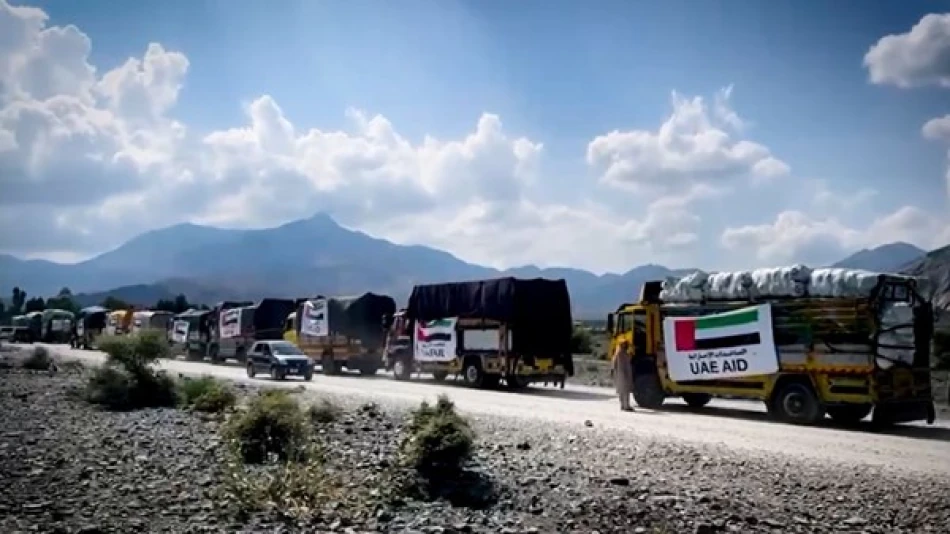
Joint Operations Team Continues Humanitarian Mission in Afghanistan
UAE Delivers Critical Aid to Afghanistan Earthquake Victims as Regional Humanitarian Leadership Takes Center Stage
The United Arab Emirates has delivered 31 trucks loaded with essential supplies to earthquake-stricken eastern Afghanistan, marking another significant humanitarian intervention that reinforces the Gulf nation's growing role as a regional crisis responder. The aid delivery to Kunar province comes as part of a broader air bridge operation coordinated by UAE leadership, demonstrating how middle powers are increasingly filling humanitarian gaps in conflict-affected regions.
Swift Response Reflects UAE's Strategic Humanitarian Positioning
The UAE's Joint Operations Command team began distributing food supplies, medical equipment, and emergency shelter materials immediately after arriving in Afghanistan last Wednesday. The operation was launched under direct orders from President Sheikh Mohammed bin Zayed Al Nahyan, highlighting how humanitarian aid has become a key pillar of UAE foreign policy.
This rapid deployment capability positions the UAE alongside established humanitarian powers like Germany and Japan, nations that have built significant soft power through consistent disaster response. The Emirates has systematically developed this capacity over the past decade, creating institutional frameworks that allow for quick mobilization during crises.
Afghanistan: A Test Case for Non-Western Aid Models
Filling the Western Aid Vacuum
The UAE's continued engagement with Afghanistan stands in stark contrast to Western nations' approach since the Taliban's return to power in 2021. While European and American aid has largely been channeled through international organizations with strict conditions, Gulf states have maintained more direct bilateral assistance programs.
This approach mirrors China's humanitarian diplomacy in regions where Western influence has waned, though the UAE's model emphasizes immediate relief over long-term development projects. The strategy appears designed to build regional influence while avoiding the political complications that have hampered Western aid efforts.
Regional Competition and Cooperation
The Emirates' Afghanistan aid operation also reflects broader regional dynamics. Saudi Arabia, Qatar, and Turkey have all increased their humanitarian footprints in South and Central Asia, creating an informal network of Muslim-majority donors that operates parallel to traditional Western aid channels.
This trend suggests a fundamental shift in global humanitarian architecture, where regional powers are taking greater responsibility for crises in their neighborhoods rather than relying primarily on UN-coordinated international responses.
Economic and Strategic Implications
Beyond humanitarian concerns, the UAE's sustained engagement with Afghanistan serves multiple strategic purposes. The Emirates has historically served as a crucial trade and financial hub for Afghan commerce, and maintaining these relationships preserves significant economic interests.
The aid delivery mechanism through the Emirates Red Crescent and the UAE Agency for International Assistance also provides valuable operational experience for future crises. This institutional learning curve positions the UAE to respond more effectively to regional disasters, from Pakistan floods to Iranian earthquakes.
The broader significance extends to global humanitarian financing patterns. As traditional Western donors face domestic pressure to reduce foreign aid spending, Gulf states' increased humanitarian budgets represent a structural shift in who funds international relief efforts and how those funds are deployed.
Looking Beyond Immediate Relief
The UAE's Afghanistan earthquake response illustrates how middle powers are reshaping humanitarian intervention in the 2020s. Unlike the large-scale, bureaucratic aid programs that characterized Western assistance in previous decades, the Emirates model emphasizes speed, direct delivery, and minimal political conditionality.
This approach may prove more sustainable in an increasingly multipolar world where traditional donor countries face competing domestic priorities. The UAE's humanitarian diplomacy offers a template that other emerging economies—from Indonesia to Brazil—are likely to study and potentially replicate in their own regional spheres.
Most Viewed News

 Layla Al Mansoori
Layla Al Mansoori






